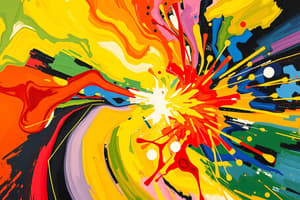Podcast
Questions and Answers
Which of the following statements about energy is true?
Which of the following statements about energy is true?
- Energy can be transferred or transformed. (correct)
- Energy exists only in one form.
- Perpetual motion machines can work indefinitely.
- Energy can be created and destroyed.
A perpetual motion machine can run forever without needing any external energy.
A perpetual motion machine can run forever without needing any external energy.
False (B)
What did Leonardo da Vinci contribute to the concept of perpetual motion machines?
What did Leonardo da Vinci contribute to the concept of perpetual motion machines?
He drew designs for several perpetual motion machines.
Energy can produce change in a __________.
Energy can produce change in a __________.
Match the following concepts related to energy:
Match the following concepts related to energy:
Flashcards
What is energy?
What is energy?
The ability to cause change in a system. For example, light energy from the sun can cause changes in plant cells, causing them to grow.
What are different forms of energy?
What are different forms of energy?
Different forms of energy include: light energy, heat energy, chemical energy, electrical energy, mechanical energy and nuclear energy.
How does energy transfer and transform?
How does energy transfer and transform?
Energy can be transferred from one object to another, like when a hot stove transfers heat energy to a pot. It can also be transformed from one form to another, like when a light bulb transforms electrical energy into light energy.
What is a perpetual motion machine?
What is a perpetual motion machine?
Signup and view all the flashcards
Why are perpetual motion machines impossible?
Why are perpetual motion machines impossible?
Signup and view all the flashcards
Study Notes
Key Concepts
- Energy causes changes in a system.
- Energy exists in various forms.
- Energy can be transferred or transformed.
- Physical quantities contribute to various forms of energy.
Curricular Competencies
- Make observations to identify questions about the natural world.
- Use scientific knowledge to draw conclusions that are consistent with evidence.
- Generate and introduce new or refined ideas.
Properties of Energy
- Perpetual motion machines are machines that run forever.
- Leonardo da Vinci designed perpetual motion machines.
- Energy is never lost, but only transferred or transformed.
- Perpetual motion machines are impossible to create.
- Many people have tried to build them.
Energy and Systems
- A system is anything that is under observation.
- Surroundings are everything that is not part of the system.
- Universe = system + surroundings
Different Forms of Energy
- Kinetic energy is the energy of motion.
- Potential energy is stored energy due to an object's position or condition.
- Examples of potential energy include chemical potential energy, gravitational potential energy, and elastic potential energy.
- Examples of kinetic energy are mechanical kinetic energy, Electrical kinetic energy, sound energy, and radiant energy.
Energy Transfer and Transformation
- Energy is neither created nor destroyed, but transformed from one form to another or transferred from one object to another.
- The law of conservation of energy states that the total energy before transformation/transfer equals the total energy after.
- Energy transformation is never 100% efficient. Some energy becomes unusable.
Types of Systems
- Open systems exchange both energy and matter with their surroundings.
- Closed systems exchange only energy with their surroundings.
- Isolated systems exchange neither energy nor matter with their surroundings.
Physical Quantities Contributing to Energy
- The mass and velocity of an object affect its mechanical kinetic energy.
- The mass, acceleration due to gravity, and height of an object affect its gravitational potential energy.
Studying That Suits You
Use AI to generate personalized quizzes and flashcards to suit your learning preferences.




